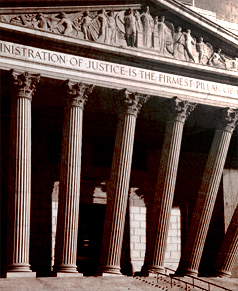Former Secretary of Defense Donald Rumsfeld once declared that individuals captured by the US military in the aftermath of 9/11 and shipped off to the Guantanamo Bay prison facility represented the "worst of the worst."
During a radio interview in June 2005,
Rumsfeld said the detainees at Guantanamo, "all of whom were captured on a battlefield," are "terrorists, trainers, bomb makers, recruiters, financiers, [Osama Bin Laden's] body guards, would-be suicide bombers, probably the 20th hijacker, 9/11 hijacker."
"We're learning a great deal of information about how al-Qaida operates, and able to stop other terrorist attacks," he added.
But Rumsfeld knowingly lied, according to a former top Bush administration official.
And so did then Vice President Dick Cheney when he said, also in 2002 and in dozens of public statements thereafter, that Guantanamo prisoners "are the worst of a very bad lot" and "dangerous" and "devoted to killing millions of Americans, innocent Americans, if they can, and they are perfectly prepared to die in the effort."
Now, in a
sworn declaration obtained exclusively by Truthout, Col. Lawrence Wilkerson, who was chief of staff to former Secretary of State Colin Powell during George W. Bush's first term in office, said he would be willing to state, under penalty of perjury, what top Bush officials knew and when they knew it.
He claims that Bush, Cheney, Rumsfeld and others knew the "vast majority" of prisoners captured in the so-called War on Terror were innocent and the administration refused to set them free once those facts were established because of the political repercussions that would have ensued.
"By late August 2002, I found that of the initial 742 detainees that had arrived at Guantánamo, the majority of them had never seen a US soldier in the process of their initial detention and their captivity had not been subjected to any meaningful review," Wilkerson's declaration says. "Secretary Powell was also trying to bring pressure to bear regarding a number of specific detentions because children as young as 12 and 13 and elderly as old as 92 or 93 had been shipped to Guantánamo. By that time, I also understood that the deliberate choice to send detainees to Guantánamo was an attempt to place them outside the jurisdiction of the US legal system."
He added that it became "more and more clear many of the men were innocent, or at a minimum their guilt was impossible to determine let alone prove in any court of law, civilian or military."
For Cheney and Rumsfeld, and “others," Wilkerson said, “the primary issue was to gain more intelligence as quickly as possible, both on Al Qaeda and its current and future plans and operations but increasingly also, in 2002-2003, on contacts between Al Qaeda and Saddam Hussein’s intelligence and secret police forces in Iraq."
"Their view was that innocent people languishing in Guantánamo for years was justified by the broader war on terror and the capture of the small number of terrorists who were responsible for the September 11 attacks, or other acts of terrorism," Wilkerson added. "Moreover, their detention was deemed acceptable if it led to a more complete and satisfactory intelligence picture with regard to Iraq, thus justifying the Administration’s plans for war with that country."
Documents have been released over the past year that showed how in 2002 several high-value detainees were tortured and forced to make statements that linked Iraq to al-Qaeda and 9/11, which the Bush administration cited as intelligence to support its invasion of the country in March 2003. But the confessions were utterly false.
Wilkerson's declaration was made in support of a
lawsuit filed by Adel Hassan Hamad, a 52-year-old former Guantanamo detainee who is suing Defense Secretary Robert Gates, former Joint Chief of Staff Richard Myers, and a slew of other Bush administration officials for wrongfully imprisoning and torturing him.
Hamad was arrested in his apartment in Pakistan in July 2002, rendered to Bagram Air Base in Afghanistan for three months, where he says he was tortured, and then transferred to Guantanamo, where he was interrogated daily and subjected to even more torture by US military personnel.
At Bagram, according to Hamad's lawsuit, "dogs were set upon [him] while watching United States military personnel laughed and mocked him." Moreover, he was forced to stand for three days without "sleep or food" and eventually collapsed. He was then sent to a hospital where it took him two weeks to recover.
"Mr. Hamad was not given notice of the basis for his detention until more than two years after first being detained, when a Combatant Status Review Tribunal (CSRT) was convened in November 2004," according to the lawsuit, filed in US District Court for the Western District of Washington at Seattle earlier this week. "Not until March 2005, nearly three full years after initially being detained, was Mr. Hamad officially labeled an 'enemy Combatant' by the flawed CSRT process," according to the lawsuit.
"However, this determination drew a rare dissenting opinion that acknowledged his enemy combatant status determination was unwarranted and, as such, would have 'unconscionable results,'" the lawsuit states. "The basis for Mr. Hamad's enemy combatant determination was simply because of his association as an employee of two organizations for whom he had done humanitarian and charity work (one of which he had left years before), and nothing more.
"In fact, a second CSRT was ordered for Mr. Hamad in November of 2007, one month before he was ultimately released to the Sudan. This was unusual, and indicates that the government recognized that the initial CSRT determination of Mr. Hamad was not accurate."
While Hamad was detained, his wife gave birth to a daughter who died some time later because the family did not have any money to pay for medical care. He has five other children.
Since he has been released, Hamad says he suffers from emotional, physical and psychological injuries and he is seeking undisclosed compensatory and punitive damages. Similar lawsuits against former Bush administration officials, however, have been dismissed in other jurisidictions.
Wilkerson said he “made a personal choice to come forward and discuss the abuses that occurred because knowledge that I served in an Administration that tortured and abused those it detained at the facilities at Guantánamo Bay and elsewhere and indefinitely detained the innocent for political reasons has marked a low point in my professional career and I wish to make the record clear on what occurred."
“I am also extremely concerned that the Armed Forces of the United States, where I spent 31 years of my professional life, were deeply involved in these tragic mistakes. I am willing to testify in person regarding the content of this declaration, should that be necessary,” he added.
Gwynne Skinner, an assistant professor of clinical law at Willamette University College of Law in Salem, Oregon and a member of Hamad's legal team, said WIlkerson's declaration was originally intended to be filed in support of Hamad's habeas corpus case, which was still pending in federal court in Washington, DC, along with more than 100 others, even though Hamad and the other former Guantanamo prisoners have already been released.
But US District Court Judge Thomas Hogan
dismissed the cases, stating the former prisoners' transfers rendered their habeas lawsuits moot. Attorneys for the detainees were upset because they had hoped the court would make a decision that would ultimately clear the peitioners' names, lift travel restrictions, and the stigma that comes from being detained at Guantanamo.
Still, Skinner said Wilkerson's declaration is signficant because it marks the first time a Bush administration official is willing to state, under oath, that Bush, Cheney, Rumsfeld and others knew many of the prisoners were innocent when they were sent to Guantanamo.
Wilkerson said detainees like Hamad were of little concern to Cheney.
The Office of Vice President Dick Cheney "had absolutely no concern that the vast majority of Guantanamo detainees were innocent, or that there was a lack of any useable evidence for the great majority of them," Wilkerson said in the 9-page declaration. Cheney's position, Wilkerson asserted, "could be summed up as 'the end justifies the means.'"
Cheney, and his daughter Liz, have been vocal critics of President Obama's efforts to shut down Guantanamo. Obama signed an executive order immediately after he was sworn into office and set a one-year deadline to close the facility. But he missed the date, due in part, to Congress' refusal to earmark funds that would have allowed the administration to close the prison and move some detainees to a supermax prison in Illinois.
Cheney
said last year that the only alternative the Bush administration had to setting up Guantanamo was to kill the prisoners detained there.
"If you don't have a place where you can hold these people, the only other option is to kill them, and we don't operate that way," Cheney said.
It is not news that the majority of the initial 742 prisoners who were detained at Guantanamo were innocent of the crimes that they were accused of.
Indeed, in February of 2006, the National Journal reviewed the case files of 132 prisoners who filed habeas corpus petitions and the redacted CSRT transcripts of 314 others and concluded that "most of the 'enemy combatants' held at Guantanamo... are simply not the worst of the worst of the terrorist world" as Cheney, Rumsfeld and Bush had claimed.
"Many of them are not accused of hostilities against the United States or its allies," according to an
investigative report published by the National Journal. "Most, when captured, were innocent of any terrorist activity, were Taliban foot soldiers at worst, and were often far less than that. And some, perhaps many, are guilty only of being foreigners in Afghanistan or Pakistan at the wrong time. And much of the evidence -- even the classified evidence -- gathered by the Defense Department against these men is flimsy, second-, third-, fourth- or 12th-hand. It's based largely on admissions by the detainees themselves or on coerced, or worse, interrogations of their fellow inmates, some of whom have been proved to be liars."
The Journal noted that a common thread among many of the detainees is that a majority of them "were not caught by American soldiers on the battlefield. They came into American custody from third parties, mostly from Pakistan, some after targeted raids there, most after a dragnet for Arabs after 9/11."
That's a point Wilkerson made in his declaration and said it likely applied to Hamad's case as well.
"With respect to the assertions by Mr. Hamad that he was wrongfully seized and detained, it became apparent to me as early as August 2002, and probably earlier to other State Department personnel who were focused on these issues, that many of the prisoners detained at Guantanamo had been taken into custody without regard to whether they were truly enemy combatants, or in fact whether many of them were enemies at all," Wilkerson said in his declaration. "I soon realized from my conversations with military colleagues as well as foreign service officers in the field that many of the detainees were, in fact, victims of incompetent battlefield vetting.
"There was no meaningful way to determine whether they were terrorists, Taliban, or simply innocent civilians picked up on a very confused battlefield or in the territory of another state such as Pakistan. The vetting problem, in my opinion, was directly related to the initial decision not to send sufficient regular army troops at the outset of the war in Afghanistan, and instead, to rely on the forces of the Northern Alliance and the extremely few US Special Operations Forces (SOF) who did not have the necessary training or personnel to deal with battlefield detention questions or even the inclination to want to deal with the issue.
"A related problem with the initial detention was that predominantly US forces were not the ones who were taking the prisoners in the first place. Instead, we relied upon Afghans, such as General [Abdul Rashid] Dostums forces, and upon Pakistanis, to hand over prisoners whom they had apprehended, or who had been turned over to them for bounties, sometimes as much as $5,000 per head.
"Such practices meant that the likelihood was high that some of the Guantanamo detainees had been turned in to US forces in order to settle local scores, for tribal reasons, or just as a method of making money. I recall conversations with serving military officers at the time, who told me that many detainees were turned over for the wrong reasons, particularly for bounties and other incentives."
In Hamad's case, Wilkerson said that he has "no reason to believe that any more thorough process was used to determine whether his seizure or transfer to Guantanamo was justified."
Wilkerson said that he discussed the Guantanamo detainees issue regularly with Powell and, based on those discussions, Wilkerson discovered that "President Bush was involved in all of the Guantanamo decision-making."
"My own view is that it was easy for Vice President Cheney to run circles around President Bush bureaucratically because Cheney had the network within the government to do so," Wilkerson said. "Moreover, by exploiting what Secretary Powell called the president’s 'cowboy instincts,' Vice President Cheney could more often than not gain the President's acquiescence."
Wilkerson said issues revolving around efforts to repatriate individuals wrongfully detained at Guantanamo came up during the morning briefings chaired by Powell that he and about 50 to 55 senior State Department officials attended beginning in August 2002 after the prison facility was opened.
"At the briefing, Secretary Powell would question Ambassador Pierre Prosper (Ambassador-at-Large for War Crimes), Cofer Black (Coordinator for Counter Terrorism), and Beth Jones (Assistant Secretary for Eurasia), or other senior personnel for information about specific progress in negotiating detainee releases," Wilkerson said. "A number of these conversations arose because Secretary Powell received frequent phone calls from British Foreign Minister Jack Straw, who had consulted with Secretary Powell frequently about repatriating the British Guantánamo detainees ...
"I also know that several other foreign ministers spoke with Secretary Powell urging him to repatriate their countries' citizens. During these morning briefings, Secretary Powell would express frustration that more progress had not been made with detainee releases."
During one particular meeting, Wilkerson said, Ambassador Prosper, the point person on negotiating the transfer of detainees to other countries, "would discuss the difficulty he encountered in dealing with the Department of Defense, and specifically Donald Rumsfeld, who just refused to let detainees go."
Wilkerson said it was "politically impossible" to release detainees, even the ones Bush, Cheney, Rumsfeld and other senior officials knew were innocent.
"The concern expressed was that if they were released to another country, even an ally such as the United Kingdom, the leadership of the Defense Department would be left without any plausible explanation to the American people, whether the released detainee was subsequently found to be innocent by the receiving country, or whether the detainee was truly a terrorist and, upon release were it to then occur, would return to the war against the US," he said. "Another concern was that the detention efforts at Guantánamo would be revealed as the incredibly confused operation that they were. Such results were not acceptable to the Administration and would have been severely detrimental to the leadership at DOD."
A spokesman for Rumsfeld said Wilkerson's claims are untrue. Peggy Cifrino, Powell's spokeswoman,
said the former Secretary of State, "has not seen Colonel Wilkerson's declaration and, therefore, cannot provide a comment."
Still, what Wilkerson described may have very well been an issue in Hamad's case, although as Jim White pointed out in
a blog post, the Pentagon appears to have had a policy in place to "justify the long-term detention and interrogation of innocent civilians."
According to Hamad's lawsuit, the Pentagon had cleared him for release in November 2005, according to a redacted copy of his clearance decision his attorneys cited in their complaint.
But he was not freed from Guantanamo until December 2007. His attorneys said they were notified via email in March 2007 that Hamad was eligible to be sent back home to Sudan and it was during negotiations with the Sudanese government that they discovered he was eligible for release a full two years earlier.
About 183 detainees, many of whom have already been cleared for release, remain at Guantanamo. A majority of them have never been charged with a crime.


.jpg)

